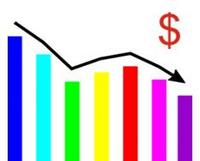Edmunds.com Reports True Cost of Incentives for April: Automotive Incentives Spending Down Five Percent from March
SANTA MONICA, Calif.--Edmunds.com, the premier online resource for automotive information, estimated today that the average automotive manufacturer incentive in the U.S. was $2,342 per vehicle sold in April 2007, down $132, or 5.3 percent, from March 2007, and up $45, or 1.96 percent, from April 2006.
Edmunds.com's monthly True Cost of IncentivesSM (TCISM) report takes into account all automakers' various U.S. incentives programs, including subvented interest rates and lease programs, as well as cash rebates to consumers and dealers. To ensure the greatest possible accuracy, Edmunds.com bases its calculations on sales volume, including the mix of vehicle makes and models for each month, as well as on the proportion of vehicles for which each type of incentive was used.
"April was a terrible sales month largely due to reduced fleet sales. Additionally, slow retail sales may be partially attributed to the five percent drop in incentives spending compared to March," stated Jesse Toprak, Executive Director of Industry Analysis for Edmunds.com. "Consumers are conditioned to wait for good deals, and in the past the wait typically pays off. As automakers attempt to move away from generous incentives programs, shoppers may take a wait-and-see attitude."
According to Edmunds.com, combined incentives spending for domestic manufacturers averaged $3,147 per vehicle sold in April 2007, down from $3,301 in March 2007. From March to April, European automakers decreased incentives spending by $25 to $3,139 per vehicle sold; Japanese automakers decreased incentives spending by $105 to $1,192 per vehicle sold; and Korean automakers decreased incentives spending by $249 to $1,750 per vehicle sold.
In April, the industry's aggregate incentive spending is estimated to have totaled approximately $3.0 billion, down from $3.8 billion in March. Chrysler, Ford and General Motors spent an aggregate of $2.1 billion, or 68.4 percent of the total; Japanese manufacturers spent $576 million, or 19 percent; European manufacturers spent $277 million, or 9 percent; and Korean manufacturers spent $106 million, or 3.5 percent.
| True Cost of IncentivesSM for the "Big Six" Automakers | ||||||
| Automaker | April 2007 | March 2007 | April 2006 | |||
| Chrysler Group | $3,994 | $4,237 | $3,542 | |||
| Ford | $3,016 | $3,113 | $3,294 | |||
| General Motors | $2,768 | $2,879 | $2,501 | |||
| Honda | $1,107 | $1,158 | $635 | |||
| Nissan | $1,912 | $2,042 | $2,393 | |||
| Toyota | $944 | $968 | $938 | |||
Edmunds' AutoObserver.com has learned that in April U.S. consumer sentiment fell to a seven-month low, according to the Reuters/University of Michigan Surveys of Consumers. “It was the third straight monthly fall in the index,” observed AutoObserver.com Senior Editor Michelle Krebs. “The survey showed increased inflation expectations among consumers, who also fretted over rising gasoline prices and troubles in the housing market.”
Among vehicle segments, large cars had the highest average incentives, $3,662 per vehicle sold, followed by minivans at $3,556. Sport cars had the lowest average incentives per vehicle sold, $787, followed by compact cars at $1,101. Analysis of incentives expenditures as a percentage of average sticker price for each segment shows large cars averaged the highest, 13.2 percent, followed by minivans at 12.8 percent of sticker price. Sport cars averaged the lowest, 2.8 percent, followed by luxury sports cars at 3.2 percent of sticker price.
Comparing all brands, in April Mini spent the least, virtually nothing, followed by Scion at $84 per vehicle sold. At the other end of the spectrum, Cadillac spent the most, $7,295, followed by Saab at $5,273 per vehicle sold. Relative to their vehicle prices, Chrysler and Mercury spent the most, 16.14 percent and 16.1 percent of sticker price, respectively, while Mini spent essentially nothing and Scion spent just 0.5 percent.
About Edmunds.com True Cost of IncentivesSM(TCISM)
Edmunds.com's TCISM is a comprehensive monthly report that measures automobile manufacturers' cost of incentives on vehicles sold in the United States. These costs are reported on a per vehicle basis for the industry as a whole, for each manufacturer, for each make sold by each manufacturer and for each model of each make. TCI covers all aspects of manufacturers' various incentives programs (except volume and similar bonus programs), including dealer cash, manufacturer rebates and consumer savings from subvented APR and lease programs (including subvented lease residual values used in manufacturer leasing programs). Data for the industry, the manufacturers and the makes are derived using weighted averages and are based on actual monthly sales and financing activity.
About Edmunds.com, Inc. (http://www.edmunds.com/help/about/)
Edmunds.com, Inc. publishes four Web sites that empower, engage and educate automotive consumers, enthusiasts and insiders. Edmunds.com, the premier online resource for automotive consumer information, launched in 1995 as the first automotive information Web site. Its most popular feature, the Edmunds.com True Market Value®, is relied upon by millions of people seeking current transaction prices for new and used vehicles. Edmunds.com was named "Best Car Research Site" by Forbes ASAP, has been selected by consumers as the "Most Useful Web Site" according to every J.D. Power and Associates New Autoshopper.com Study(SM), was ranked first in the Survey of Car-Shopping Web Sites by The Wall Street Journal and was rated "#1" in Keynote's study of third-party automotive Web sites. Inside Line launched in 2005 and is the most-read automotive enthusiast Web site. CarSpace launched in 2006 and is an automotive social networking Web site. AutoObserver.com launched in 2007 and provides insightful automotive industry commentary and analysis. Edmunds.com, Inc. is headquartered in Santa Monica, California, and maintains a satellite office in suburban Detroit.



